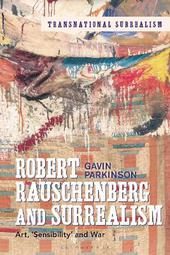
|
Robert Rauschenberg and Surrealism: Art, 'Sensibility' and War
Hardback
Main Details
Description
The art of Robert Rauschenberg (1925-2008) is usually viewed as quite distinct from Surrealism, a movement which the artist himself displayed some hostility towards. However, Rauschenberg had a very positive reception among Surrealists, particularly across the period 1959-69. In the face of Rauschenberg's avowals of his own 'literalism' and insistence on his art as 'facts,' this book gathers generous evidence of the poetic, metaphorical, allusive, associative and connotative dimensions of the artist's oeuvre as identified by Surrealists, and thus extrapolates new readings from Rauschenberg's key works on that basis. By viewing Rauschenberg's art against the expansion of the cultural influence of the United States in Europe in the period after the Second World War and the increasingly politicized activities of the Surrealists in the era of the Algerian War of Independence (1954-62), Robert Rauschenberg and Surrealism shows how poetic inference of the artist's work was turned towards political interpretation. By analysing Rauschenberg's art in the context of Surrealism, and drawing from it new interpretations and perspectives, this volume simultaneously situates the Surrealist movement in 1960s American art criticism and history.
Author Biography
Gavin Parkinson is Professor of European Modernism, The Courtauld Institute of Art, UK.
ReviewsParkinson's expansive study opens up poetic, allusive, and sometimes political layers in Rauschenberg 's works, unearthing important responses from Parisian critics and writers. This approach unexpectedly establishes Rauschenberg's Surrealist inflected roots, whilst contributing to the recent wave of expanded consideration of post-war, later Surrealism. * Lewis Kachur, author of Displaying the Marvellous: Marcel Duchamp, Salvador Dali, and Surrealist Exhibition Installations (2001), and Professor of Art History, Kean University, USA * With remarkable precision, thoroughness, and generative energy, Parkinson's book offers an authoritative account of the French surrealist reception of Rauschenberg's work in the 1960s. Analysing little-known and untranslated texts, Parkinson shows just how enmeshed the aesthetic and political registers were for these writers and artists. * Edward Krcma, Associate Professor of Art History, Department of Art History and World Art Studies, University of East Anglia, UK *
|